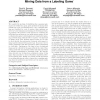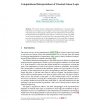674 search results - page 19 / 135 » Preferences in Game Logics |
NIPS
2004
13 years 9 months ago
2004
We consider multi-agent systems whose agents compete for resources by striving to be in the minority group. The agents adapt to the environment by reinforcement learning of the pr...
WWW
2009
ACM
14 years 8 months ago
2009
ACM
We consider the problem of identifying the consensus ranking for the results of a query, given preferences among those results from a set of individual users. Once consensus ranki...
WOLLIC
2007
Springer
14 years 1 months ago
2007
Springer
We survey several computational interpretations of classical linear logic based on two-player one-move games. The moves of the games are higherorder functionals in the language of ...
ATAL
2010
Springer
13 years 8 months ago
2010
Springer
The paper applies modal logic to formalize fragments of argumentation theory. Such formalization allows to import, for free, a wealth of new notions (e.g., argument equivalence), ...
JOLLI
2006
13 years 7 months ago
2006
Agents often interact strategically to meet conditions involving their own or other agents' knowledge. This interaction can be modeled using a new method of game construction...


